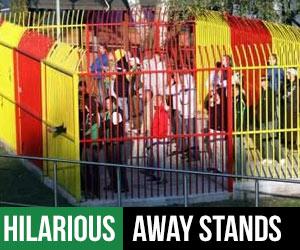Want to buy pyrotechnics? Visit pyro.ultras-tifo.net
 Danish fans protest against ID cards for away fans.
Danish fans protest against ID cards for away fans.
Danish fans protest against ID cards for away fans.

(Stop national away card)
Danish Football Federation is about to introduce a new ID card required for football fans following their team on away matches. Without this ID card, you won't get access to the away sector.
All clubs agree with this idea, while all the supporter groups stand united against this card.
ID cards for away fans in Denmark
Ultras-tifo.net got permission from the author to publish this text, which originally was published on fanseurope.org.
The federation of Danish Football Fan Clubs (DFF) – Danske Fodbold Fanklubber – is a Danish umbrella organization for Danish supporters and members of FSE. In the past DFF launched a campaign against mandatory “away cards” – a proposal the Danish League Association have made due to safety and security concerns. So why is the DFF fighting this decision?
The background for the decision goes back to 2012, where a match on March 3rd between Aalborg Boldklub and FC Copenhagen made media headlines, with lots of pyro and almost riot looking footage from the away section. The Ministry of Justice, the Danish FA, the police, the clubs and the fans then came together, and agreed to work on a plan to secure better football experiences for everyone. In the joint plan a “common entry system” was suggested as a possible action point. Ever since then the focus in Danish security aspects has been on dialogue. Police are being trained as special event police and using dialogue as a tool; SLOs (fan coordinators) are being introduced in the Danish Super League and an ongoing dialogue and cooperation is happening with the supporters.
So naturally the members of the DFF were shocked when they learned that the Danish League Association were to introduce a mandatory away card from the season 2015/16, ignoring the progress of the ongoing dialogue. The Danish fans thought that the plan of a mandatory away card had been discarded due to the positive focus on dialogue since 2012. The card will be an ID-card, mandatory if you want to follow your team away, and mandatory for everyone, even children. To get the card you have to apply online some weeks before the match, listing your name, address, birthday and even how tall you are – and include a picture. You have to show up in person to get the card, and after a introductory period it will cost a fee. The card will not give you any advantages – no discounts, and no advantages for the most loyal fans.
Experiences from all over Europe show that ID cards only lead to one thing: fewer spectators. And it does not enhance security, but rather tends to move problems around, and doesn’t keep the fans from causing trouble i.e. using illegal pyro. For the same reason the use of fan ID-cards has been aborted in Belgium, will be dropped in Poland after this season, and is unfortunately still causing lower attendance and even boycotts in Italy, Hungary and Turkey.
Rasmus Trenskow, chairman of the DFF, states: “We are against an away-card solution, because it is well documented that it does not improve the safety and security situation at the stadium. The preventive effect is non-existent. These kinds of solutions are giving a false picture of the fan scene, and we cannot recognize the need for this in any way”.
Mandatory away cards do not enhance stadium security and it has no proven preventive effects. Even the Council of Europe´s Committee on Spectator Violence has commented on the use of away cards in a report looking at Croatian football:
…”the scheme appears to be empowering rather than excluding or marginalizing the influence of risk supporters. The scheme has resulted in traditionally rival supporters uniting, and working together, in opposition to the scheme. Certain elements within the established fan groups may have a vested interest in this opposition (to avoid detection etc.) but the strength of the resistance goes much deeper and, moreover, appears to be deterring thousands of potential well-intentioned supporters from attending even high profile matches. This outcome is by no means unique to Croatia. European experience demonstrates that restrictive ticketing schemes do not provide an alternative to effective exclusion arrangements, nor, in isolation, can they hope to generate the kind of safe, secure and welcoming atmosphere that is likely to encourage a wider cross section of the community to attend matches.
Furthermore, potential spectators can be deterred from attending matches by the prospect of having to join a ticket registration or voucher scheme, not least because such schemes are often perceived as indicative of the football experience being neither safe nor secure.”
So is Danish football so unsafe that a measurement like this is needed? Actually statistics show that years of focusing on dialogue has caused the numbers of arrests in connection with football to drop. With more than 1.5 million spectators attending the 198 matches played in the Super League – only 19 people were arrested during the matches. Most incidents leading to arrests happen outside the stadium – so how could an away card increase safety and security?
And it is not like the use of away cards is completely new to Danish football. FC Copenhagen introduced mandatory away cards in 2008, and it has had absolutely no effects on the behavior of FCK supporters. There are still lots of illegal pyro when they play away, and there are still incidents before, during and after the matches. When FC Copenhagen fans caused the state of almost riots in the stands in Aalborg in 2012, the away card was in use, and supporters of FC Copenhagen have ever since been involved in several incidents away – even in Europe – where they have displayed that the away card has no effect.
Based on European experiences, as well as observing the effect of an away card in FC Copenhagen – the members of the DFF are saying a big NO to away cards in the campaign #Nejtilawaykort (notoawaycard). The fans are working together on the campaign, and they have made a web page and a page on Facebook.
FSE is supporting the Danish supporters. CEO Daniela Wurbs on the introduction of mandatory away cards: “Why is Denmark introducing a system which was tried but abolished in Belgium, is currently abolished by the government in Poland after several years – both times because it proved non-useful for effective prevention and enhancing security in football? A system which led to up to 90% attendance drops in Turkish, Italian and Hungarian football at some clubs, and to major national sponsors pulling out of the game? I personally hope that Danish fans will raise their voices loudly and clearly against this. And even more I hope that the football authorities will back off from their plans and consider other means of prevention, together with their fans. This away card is neither a business opportunity nor enhancing security. It is nothing but damaging the game for all.”
FSE is against any kind of mandatory fan-card. It seems to be spreading like a virus throughout Europe, and the football governing bodies have turned the blind eye to the fact that these kinds of schemes do not improve safety and security in football at all.

(Will we see empty away sectors in Denmark now?)
Source: www.fanseurope.org











